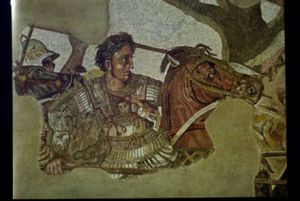 About Us
About Us  Embassy of Greece in London
Embassy of Greece in London  News
News  "Discovering the World of Alexander the Great" international conference in Naoussa
"Discovering the World of Alexander the Great" international conference in Naoussa
"Discovering the World of Alexander the Great" international conference in Naoussa

The overall picture of the research on Alexander
the Great and the impact of his course in the world will be presented at an
international scientific congress tiled "Discovering the World of
Alexander the Great" which opened Thursday at the Aristotle's School
(Ancient Mieza) in Naoussa, organized by the 17th Ephorate of Prehistoric and
Classical Antiquities and the Polycentric Museum of Aigai.
The three-day conference, which opens Thursday
and will run through Saturday, while on Sunday a one-day conference will be
held on the Aigai Palace that includes a tour of the site.
The conference aims to inform the international scientific community and wider public on the "Alexander the Great Virtual Museum: From Aigai. to the Acumen (world)", a major and innovative digital project inspired, designed and carried out by the Ephorate with financing from the National Strategic Reference Framework-NERVE (Digital Convergence).
An overall picture of the research on Alexander
the Great and the impact of his route will be presented for the first time.
Another important aspect of the conference is the presentation of the
archaeological surveys conducted in the countries which constituted the
Hellenistic world: scientists of international repute and directors of
excavations from Turkey, Jordan, Israel, Egypt,
Uzbekistan, Tajikistan and Afghanistan, and also from England, France, Germany,
Italy, Switzerland, Russia and Greece will sum up their surveys and announce
the new historical and archaeological data about the cities of Asia Minor, the
southern Levant, Egypt of Mesopotamia, Persia, Baktria etc. Furthermore,
researchers, historians and museum directors will talk about Alexander the
Great’s personality and how he influenced history, myth and art.
The network of cities founded by Alexander the Great and his successors, in which older cities were also organically incorporated by combining local and Hellenistic features, became the geographical and cultural space of the Hellenistic era and the first form of universality. At that time, for the first time, a new way of communication and spreading of cultural goods appeared, a new experience of community and relations between people, a way of perceiving space and time as "our world", and living within it as having a common language, an "ecumene".
At the one-day conference, all new archaeological data which came to light during the surveys in the palace of Aigai will be presented. The emblematic building founded by Philip II of Macedon in the second half of the 4th century BC became the architectural, technical, artistic, political and philosophical model of the public building which dominated the Hellenistic, Roman and Medieval world. The ecumenical aspect of the Aigai Palace will be examined at a roundtable discussion.


















